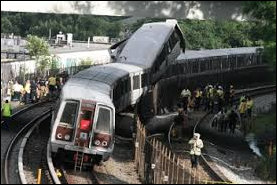 Ninety-four percent of the Washington Metro’s largest labor union, Amalgamated Transit Union Local 689 voted to authorize labor leaders to call a transit strike. Metro workers are forbidden from striking under the mass transit system’s governing authority, and a judge could order strikers back to work. But even a one-day walkout could cause massive disruption to Northern Virginia’s overloaded transportation system.
Ninety-four percent of the Washington Metro’s largest labor union, Amalgamated Transit Union Local 689 voted to authorize labor leaders to call a transit strike. Metro workers are forbidden from striking under the mass transit system’s governing authority, and a judge could order strikers back to work. But even a one-day walkout could cause massive disruption to Northern Virginia’s overloaded transportation system.
“We understand the ramifications of what we’re asking our members, we understand what a strike would mean,” said Jackie L. Jeter, president of the union, which includes about 8,000 of Metro’s 12,500 active workers.
“We will decide the when and where and how,” Jeter said at a news conference, as reported by the Washington Post. “We have to call a meeting of the executive board after this vote, and then we’ll decide on what we’re going to do.”
The vote follows “late-out” demonstrations on July 4 and Thursday, in which some employees arrived after the start of their scheduled shifts, delaying some bus service. The actions were meant to send a message to Metro management about stalled contract negotiations, job cuts, privatization, duty reassignments and other issues. Local 689 has been without a contract since July 2016.
Metro management under General Manager Paul J. Wiedefeld made serious efforts to boost efficiency and productivity at the money-losing organization that has fallen billions of dollars behind in maintenance expenditures, has experienced chronic safety and reliability issues, and has suffered ridership declines.
The union has not gone out on strike since a wildcat walkout 1978. But after all the safety incidents and with all the trouble keeping trains on schedule, Metro riders don’t want to hear about potential labor disruptions. The union action is only a threat at this point, but riders who are skeptical that Metro offers a viable transportation option will not be reassured.


